

Information for Editors. About MDPI MDPI is one of the forerunners and a leader when it comes to the open access publishing model.
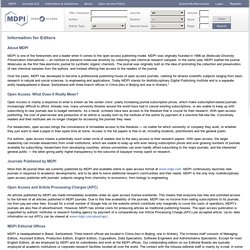
MDPI was originally founded in 1996 as Molecular Diversity Preservation International — an institute to preserve molecular diversity by collecting rare chemical research samples. In the same year, MDPI started the journal Molecules as the first free electronic journal for synthetic organic chemists. The journal was originally built on the idea of promoting the collection and preservation of rare chemical samples from the authors, and instead offering free access to the readers of the journal.
Over the years, MDPI has developed to become a professional publishing house of open access journals, catering for diverse scientific subjects ranging from basic research in natural and social sciences, to engineering and applications. Open Access. For authors, open access means a potentially much wider circle of readers due to the easy access to their research papers. Peer review is vital but its closed nature belongs to a bygone age. It’s time to open up.
Biases, deliberate delay, repeated rejection – peer review has its problems but it is a crucial part of research dissemination, writes Rebecca Lawrence, who explains that open publication of all good science followed by open peer review is the key to future publishing.
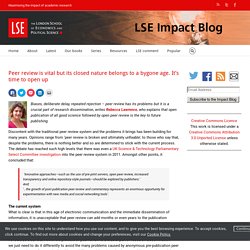
Discontent with the traditional peer review system and the problems it brings has been building for many years. Opinions range from ‘peer review is broken and ultimately unfixable’, to those who say that, despite the problems, there is nothing better and so are determined to stick with the current process. The debate has reached such high levels that there was even a UK Science & Technology Parliamentary Select Committee investigation into the peer review system in 2011. Amongst other points, it concluded that: Leading Humanities Journal Debuts 'Open' Peer Review, and Likes It - Publishing. By Jennifer Howard Getting published in a humanities journal usually works like this: Submit an article, then hope for the best as the editors send it to a few hand-picked specialists for critique.
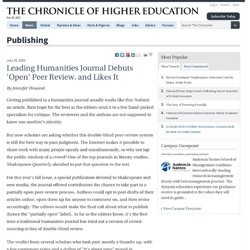
Open peer review & community peer review. There has been a lot of discussion about 'open peer review' lately - this letter to Nature is just the latest example.
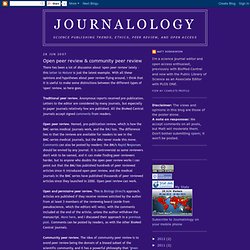
With all these opinions and hypotheses about peer review flying around, I think that it is useful to make some distinctions between the different types of 'open' review, so here goes. Traditional peer review. Anonymous reports received pre-publication. Letters to the editor are considered by many journals, but especially in paper journals relatively few are published. All the BioMed Central journals accept signed comments from readers. Home Page. Peerage of Science. Online Social Network Seeks to Overhaul Peer Review in Scientific Publishing. Three Finnish researchers have created an online service that could eventually replace or supplement the current way journals get scientists to peer review submitted manuscripts.
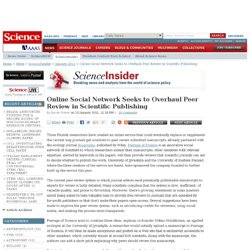
Already partnered with the ecology journal Ecography , published by Wiley , Peerage of Science is an innovative social network of scientists to which researchers submit their manuscripts; other members with relevant expertise, alerted by keywords in the papers, will then provide reviews that scientific journals can use to decide whether to publish the work. University of Jyväskylä and the University of Eastern Finland, where the three creators of the service are based, have sponsored the company founded to further build up the service this year. Multi-Stage Open Peer Review: Scientific Evaluation Integrating the Strengths of Traditional Peer Review with the Virtues of Transparency and Self-Regulation. Faculty of 1000.
Sympoze to Crowd Source Peer-Review and Create Open-Access Publications. I am very excited to announce that Sympoze is transforming into an even better service for philosophers.
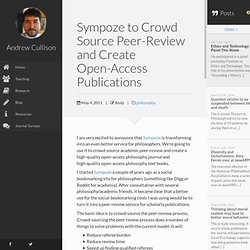
We’re going to use it to crowd-source academic peer-review and create a high-quality open-access philosophy journal and high-quality open-access philosophy text books. I started Sympoze a couple of years ago as a social bookmarking site for philosophers (something like Digg or Reddit for academia). For Scholars, Web Changes Sacred Rite of Peer Review.
Open Peer Review: Why Peer Review Should Not Be Anonymous. Age-related human small intestine methylation: evidence for stem cell niches. Crowd sourcing peer review? Free open access? Sympoze » Maintenance Mode. Fixing the Peer Review Process by Crowdsourcing It? Try the following experiment.
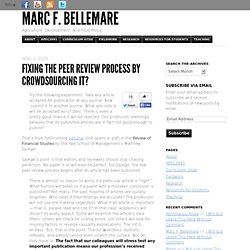
Take any article accepted for publication at any journal. Now submit it to another journal. What are odds it will be accepted as is? Zero. There is even a pretty good chance it will be rejected. That’s from forthcoming editorial (link opens a .pdf) in the Review of Financial Studies by the Yale School of Management’s Matthew Spiegel.
Spiegel’s point is that editors and reviewers should stop chasing perfection. There is almost no reason to worry if a particular article is “right.” A recent example of the vetting process described by Spiegel relevant to development economics is that of David Roodman and Jonathan Morduch failing to replicate failing to replicate earlier findings by Mark Pitt and Shahidur Khandker. (HT: Gabriel Power.) Crowdsourcing peer review. It is the greatest question in computer science.
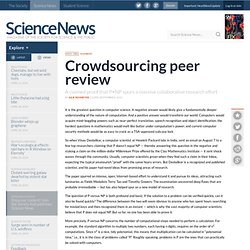
A negative answer would likely give a fundamentally deeper understanding of the nature of computation. And a positive answer would transform our world: Computers would acquire mind-boggling powers such as near-perfect translation, speech recognition and object identification; the hardest questions in mathematics would melt like butter under computation’s power; and current computer security methods would be as easy to crack as a TSA-approved suitcase lock. So when Vinay Deolalikar, a computer scientist at Hewlett Packard labs in India, sent an email on August 7 to a few top researchers claiming that P doesn’t equal NP — thereby answering this question in the negative and staking a claim on the million-dollar Millennium Prize offered by the Clay Mathematics Institute — it sent shock waves through the community.
More precisely, P versus NP concerns the number of computational steps needed to perform a calculation. How Will Crowdsourcing Revolutionize Academic Peer Reviews? Googling Peer Review – The Aporetic. Who is not ambivalent about peer review?
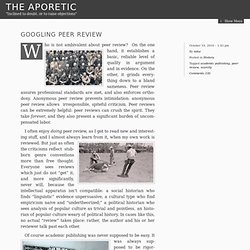
On the one hand, it establishes a basic, reliable level of quality in argument and in evidence. On the other, it grinds everything down to a bland sameness. Peer review assures professional standards are met, and also enforces orthodoxy. Anonymous peer review prevents intimidation: anonymous peer review allows irresponsible, spiteful criticism. Peer reviews can be extremely helpful: peer reviews can crush the spirit. I often enjoy doing peer review, as I get to read new and interesting stuff, and I almost always learn from it, when my own work is reviewed. But just as often the criticisms reflect stubborn genre conventions more than free thought. Of course academic publishing was never supposed to be easy. It was always supposed to be rigorous, demanding, and difficult, and for good reason.
The profession’s origins lie in class privilege: “peer” has origins in “peerage,” and class exclusivity. The case against double-blind peer review. Many scientific journals use double-blind peer review.
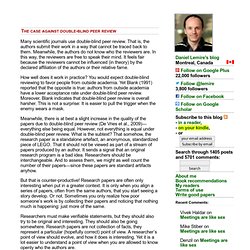
That is, the authors submit their work in a way that cannot be traced back to them. Meanwhile, the authors do not know who the reviewers are. In this way, the reviewers are free to speak their mind. It feels fair because the reviewers cannot be influenced (in theory) by the declared affiliation of the authors or their relative fame. Blind no more! « scatterplot. Rejecting Double Blind. The American Economic Association announced last week that it is ending "double blind" peer review, the traditional system in the social sciences in which authors of submitted articles are not known to reviewers, nor are reviewers known to authors. Political Analysis, a key journal in political science, is making a similar shift. Starting July 1, the economics association's journals -- which include the most influential in economics -- will go to "single blind" reviews.
(Those submitting articles will not know who their referees were.) A statement released by the association cited issues of both technology and ethics to explain the shift. "Easy access to search engines increasingly limits the effectiveness of the double-blind process in maintaining author anonymity. Jonathan N. Flagship journals that use double blind include American Anthropologist, American Political Science Review and American Sociological Review. Reviewing and Revamping the Double-Blind Peer Review Process. This paper was refereed by the Journal of Electronic Publishing's peer reviewers. Abstract The traditional double-blind peer review process currently used to determine which articles are published in scientific journals is far from perfect. This article argues that the Internet can provide us with a better way to judge article quality using the opinion of every reader rather than that of only a couple of reviewers.
The article offers a relatively simple business model that can provide funding for such a publishing system. The model contains three basic components: a reviewing component, a submission/cost component, and a distribution component.